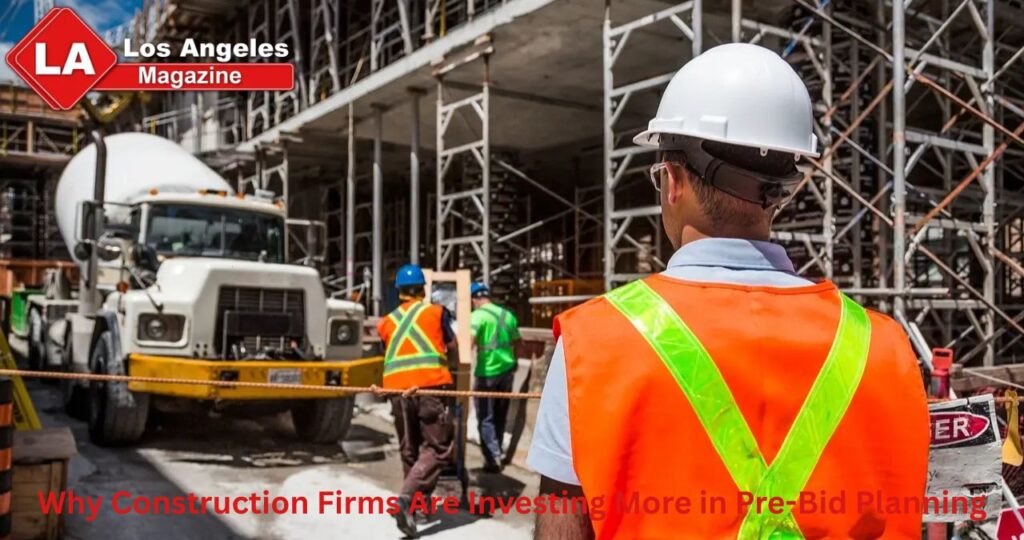In the present-day fast-transferring and fairly aggressive construction industry, prevailing the proper projects isn’t pretty much having the lowest bid — it’s approximately approach, precision, and planning. More and more creation corporations are figuring out that the real work starts before a bid is even submitted. Pre-bid making plans is turning into a cornerstone of success, supporting firms to sharpen their competitive aspect, avoid steeply-priced surprises, and supply stronger project outcomes.
Let’s take a closer look at why this shift in the direction of pre-bid planning is gaining momentum — and why companies that forget it are able to be left at the back of.
The Power of Preparation: What Is Pre-Bid Planning?
Pre-bid planning refers to all the strategic, technical, and financial preparation carried out earlier than filing a bid on a creation assignment. This includes studying site conditions, estimating prices, identifying ability dangers, aligning resources, or even defining project timelines. Unlike traditional bidding, in which much info is addressed after the agreement is gained, pre-bid planning takes a proactive method, making sure teams enter the bidding procedure knowledgeable and geared up. It’s more than only a tick list. It’s a mindset shift — from reacting to possibilities to engineering fulfilment from the very start.
Standing Out in a Competitive Market
With more contractors bidding for fewer excessive-value tasks, the pressure to face out has never been higher. A generic bid filled with assumptions or indistinct timelines doesn’t inspire self-assurance from developers, especially when tens of millions are on the line. On the other hand, a nicely prepared bid shows foresight, professionalism, and a deep knowledge of the mission requirements. This is where offerings like Office Equipment Installation can play a strategic role — now not just throughout the construction section but also as part of a comprehensive proposal. Many creation firms now associate with specialists in gadget planning and set up early on to expose clients so they can deliver fully useful areas, ready for occupancy.
Accurate Cost Forecasting Saves Time and Money
One of the most important pitfalls in production is inaccurate bidding, whether or not it’s underestimating exertion charges or overlooking website-specific online demanding situations. These oversights can value corporations dearly in trade orders, delays, and damaged reputations. That’s why pre-bid making plans frequently include partnering with experts to increase unique fee forecasts. Leveraging tools like 3D modeling, ancient project statistics, and collaborative input from engineers and architects allows companies to create estimates which might be grounded in truth. Many firms additionally incorporate hospitality procurement services at this stage, mainly for business or resort-associated builds, making sure cloth fees, furnishings, and logistics are all priced efficiently before a single brick is laid. The goal? Submit a bid that’s no longer simply aggressive — however profitable, executable, and low-danger.
Risk Management Starts Early
Every task has its dangers, from website online entry to issues and weather situations to fluctuating material fees and labor shortages. Pre-bid making plans allow companies to pick out and account for these factors before they end up with limitations. By growing contingency techniques and adjusting bid margins thus, businesses are better positioned to shield their bottom line and maintain purchaser trust. This foresight frequently results in stronger contractual terms, fewer disputes, and smoother execution on the website.
Cross-Department Collaboration Pays Off
Another reason why pre-bid planning is becoming more commonplace is its capability to unite teams across the business enterprise. Estimators, challenge managers, procurement officers, and area supervisors all carry special views to the desk. When those voices are aligned early on, bids grow to be greater practical and complete. This teamwork regularly ends in extra correct timelines, better useful resource allocation, and clear scope definition — all things that customers cost in a companion. Construction corporations that undertake a collaborative tradition for the duration of the pre-bid phase are some distance much more likely to deliver on their promises and construct lengthy-term relationships with builders.
Clients Want Confidence, Not Guesswork
Developers and clients are more informed than ever before. They’re now not just searching at the bottom rate — they’re asking difficult questions on schedules, materials, and execution. They need to know that a contractor has finished their homework and might supply as promised.
A properly deliberate bid displays a firm’s credibility and commitment. It suggests to customers that the builder has a concept through every attitude, anticipated viable troubles, and constructed a roadmap to fulfilment. In many instances, this degree of instruction turns into the identifying aspect of who wins the job.
Leveraging Technology for Smarter Bids
Digital tools have transformed the way production firms plan and rate their work. From Building Information Modeling (BIM) to cloud-based totally estimating software, groups now have access to data which could streamline the complete bidding procedure. These gears help teams visualize projects, run value simulations, and track percentage updates in real-time. Firms that embrace generation in the pre-bid section are frequently quicker, more agile, and more transparent — qualities that resonate with current customers.
Long-Term Value Over Short-Term Wins
While pre-bid planning may require extra time and resources prematurely, the long-term advantages of some distance outweigh the fees. Firms that consistently engage in thorough instruction win more projects, revel in fewer delays, and guard their earnings margins.
It’s also approximately building a reputation. A contractor recognized for unique, dependable proposals is far much more likely to be trusted — and invited — to bid on destiny initiatives. Over time, this popularity becomes a competitive moat that continues new possibilities flowing.
Final Thoughts
Construction is an industry where the smallest misstep can lead to big effects. That’s why ahead-questioning companies are making an investment more than ever in pre-bid planning. It’s now not pretty much landing a settlement — it’s approximately setting the degree for a successful, on-time, and on-budget build. From aligning inner groups to forecasting costs and demonstrating credibility, the advantages of early education are clear. In a marketplace where every area counts, clever pre-bid-making plans may be the neatest pass of all.



